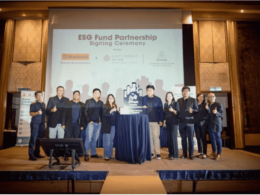Arab African International Bank (AAIB) has issued a $500 million sustainability bond to support Egypt’s green transition and expand financial inclusion for micro, small, and medium-sized enterprises (MSMEs). This landmark issuance, the first of its kind in Egypt and the largest sustainability bond by a private bank in Africa, highlights growing international confidence in Egypt’s economic and environmental potential.
The bond has attracted investments from the International Finance Corporation (IFC), the European Bank for Reconstruction and Development (EBRD), and British International Investment (BII). IFC subscribed $300 million, while EBRD and BII each contributed $100 million. Seventy-five percent of the proceeds will fund green projects, including industrial energy efficiency, small-scale renewable energy, and green buildings. The remaining 25 percent will support social initiatives, such as inclusive finance and MSME development.
The initiative aligns with Egypt’s goal to reduce greenhouse gas emissions by 37 percent by 2030, announced as part of its climate resilience strategy in 2023. The bond is expected to facilitate financing for projects that lower emissions and protect the environment while addressing the significant funding needs of MSMEs.
“This bond is more than just a financial instrument; it is a strategic extension of our core business model, designed to seamlessly integrate sustainability into our business strategy. We are ensuring that AAIB remains at the forefront of both financial innovation and environmental stewardship by directing capital toward projects that advance ESG,” said Tamer Waheed, AAIB’s Vice Chairman & Managing Director.
Sérgio Pimenta, IFC’s Vice President for Africa said, “This investment is a milestone in extending more financial inclusion while unlocking the potential of sustainable finance in Egypt. As the largest investor in the country’s first sustainability bond issued by AAIB, we are empowering a greener, more climate-resilient future for Egypt and contributing to the country’s climate commitments.”
EBRD’s Managing Director for Financial Institutions, Francis Malige, lauded the bond’s broader impact on capital markets and sustainable finance. He said, “We are very proud to invest in this first sustainability bond in Egypt, which opens the path for more such issuances and sets a benchmark for others to follow. This landmark investment will increase capital market flows towards green and social projects and demonstrates the importance of ingraining green and social criteria in capital markets transactions. Moreover, this project contributes to the resilience of the economy by providing long-term hard currency funding.”
BII’s Regional Director for North Africa, Sherine Shohdy, highlighted the role of private capital in driving Egypt’s climate transition. “The AAIB bond will provide a vital source of finance to businesses to take steps towards the transition. Over the last two years, BII has committed over £1.2 billion in climate finance, and we will continue to deploy our capital in support of the transition towards net zero and climate-resilient economies. Egypt is a key market for BII. As of 2023, the company’s portfolio in Egypt was valued at $707.5 million, with investments in 70 companies that support over 91,000 jobs. BII’s current development focus in Egypt includes financial services, renewable energy, healthcare, and infrastructure.”















